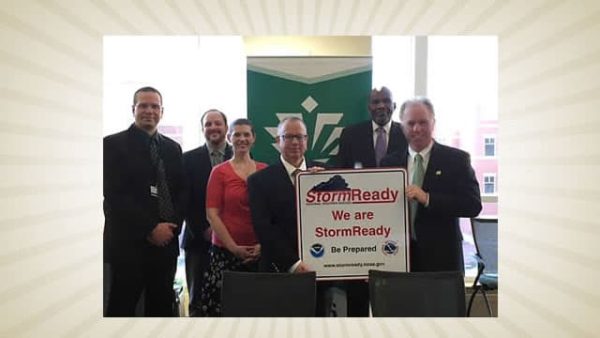UNC Charlotte named a ‘StormReady Community’

After three years of preparation and extensive review from the National Oceanic and Atmospheric Association (NOAA), UNC Charlotte has received the official designation as a “StormReady Community.”
StormReady is a community preparedness program of the National Weather Service, a division of NOAA; the program encourages government entities and commercial gathering sites to prepare for severe storms.
“Receiving this designation is a testament to Chancellor Dubois’ commitment to making sure our community is as safe as possible and a model for other campuses across the system,” said Chris Gonyar, director of business continuity and emergency management planning at UNC Charlotte.
Police and public safety Lt. Brian Thomas, who also a campus emergency management coordinator, agrees. He said being named a ‘StormReady Community’ spotlights the campus as a credible source to distribute information.
“It’s a reassurance that our community is getting accurate information and also receiving it in a timely manner,” said Thomas.
UNC Charlotte’s use of various weather alert systems, such as a yellow banner on the University’s homepage, email notifications and the mobile app Live Safe helped to achieve the designation. Also, nearly 200 weather radios were distributed to the Housing and Residence Life Office and are in use by residence assistants and each college on campus.
UNC Charlotte is the seventh school in the UNC system to obtain this designation.
“Although we cannot prevent weather disasters we can control how we plan for and respond to them. This designation speaks to the hard work of individuals across campus to be ready to respond to any type of severe weather event,” Gonyar continues.
Adverse weather can have significant consequences. According to the National Weather Service, each year, the United States averages about 10,000 thunderstorms, 5,000 floods, 1,000 tornadoes and two hurricanes. Roughly 90 percent of presidentially declared disaster areas are weather-related.
At UNC Charlotte, when weather threatens campus operations, an adverse weather team responds. This team includes representatives from facilities management, police and public safety, auxiliary services (parking, dining, transportation, etc.), housing and residence life, university communications and many others units.
Typically, staff in the Office of Business Continuity Planning (BCP) begin intently monitoring local weather conditions, using the Internet and TV, and personnel may consult with the National Weather Service for the Southern Piedmont region.
While dozens of University employees directly help prepare for and respond to inclement weather, most of the campus community is unaware of the complex considerations that affect the decision to delay or cancel classes, close campus or continue the standard schedule.
The University chancellor, in consultation with the vice chancellor for business affairs, makes the final decision regarding campus operations in the event of adverse weather.
Prior to an anticipated weather event, the adverse weather team begins to discuss conditions and to consider options for a final decision. As the expected adverse weather nears the area, campus leaders receive assessments of conditions on campus and in the University’s area – including the surrounding counties from which students and employees commute. The team also considers decisions made by other local organizations, including Charlotte-Mecklenburg Schools, Charlotte Area Transit System (CATS), Charlotte Douglas Airport.
University Policy 701 “Campus Operation Status, Including Adverse Weather and Emergency Events” also provides guidance on alterations to normal operations.